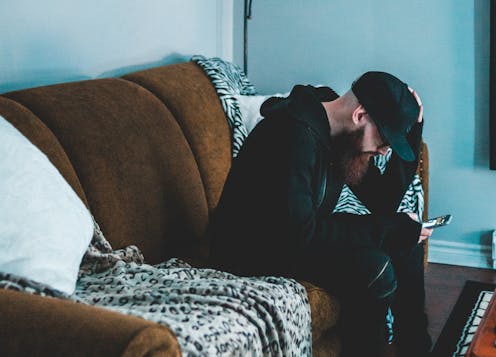Here's how Americans coped during the beginning of the COVID-19 pandemic
- Written by Melissa Cyders, Associate Professor of Psychology, IUPUI

The COVID-19 pandemic has changed everyday life for Americans. How well are people across the country dealing with the new reality of closed businesses, shuttered schools, social distancing and the threat of the coronavirus itself?
As psychology[1] researchers[2], we decided to conduct an online survey to find out. On March 26, we asked 500 adults from age 19 to 78 a series of questions to help us better understand how Americans are mentally coping with the pandemic. The group represented 47 U.S. states and roughly matched the age, race and gender demographics of the nation.
Though not yet peer-reviewed, these responses provide a snapshot of Americans’ mental health as the coronavirus pandemic really started to ramp up, as well as a hint about groups who might struggle during this unprecedented time.
Doing basically OK
Overall, our survey indicated that Americans were coping fairly well as of late March. Our respondents reported only moderate levels of stress and worry about COVID-19, estimating their individual likelihood of becoming infected as only around 30%, on average.
Despite the anecdotal impression that younger people are less worried about the pandemic, all age groups reported similar levels of worry and estimated they had about the same chance of being infected.
There were no big surprises in how individuals reported most commonly coping with pandemic-related challenges: They were talking with friends, watching TV, exercising, listening to news and engaging in hobbies. The most effective coping strategies included problem-solving, exercising, engaging in hobbies and focusing on what they felt thankful for. These strategies were associated with lower self-reported stress and better self-reported coping with the pandemic.
Some people having a tougher time
However, not all Americans were coping well. There were some groups who appeared more vulnerable to negative effects of pandemic stress.
About 35% of our survey respondents reported changes in their employment since the beginning of the U.S. COVID-19 pandemic. This is an increase from earlier estimates in mid-March that 1 in 5 American workers had lost their jobs[3] or had them reduced.
Not only are they dealing with the usual stressors related to the pandemic; they also have to worry about whether they’re going to make it through this period financially. Unsurprisingly, these individuals reported more stress and worry, rated their chances of being infected with COVID-19 as higher and said they were coping less effectively with the pandemic.
Americans living in urban regions also reported more worry about the pandemic and were coping less effectively than those in suburban and rural regions. This might be because COVID-19 first hit urban areas, including Seattle, New York and Los Angeles. However, people across rural, urban and suburban regions all put their own odds of getting infected with COVID-19 around the same 30% chance.
About 18% of the sample reported being at a higher risk for COVID-19 due to a pre-existing condition, including being immunocompromised, having a respiratory illness or being over the age of 65. Unsurprisingly, people in this group reported more worry, rated their chances of becoming ill as higher and stated they were coping less effectively.
Women bearing more, coping less well
Women reported more anxiety, stress and worry, believed they had higher chances of being infected with COVID-19 and were coping less effectively than men.
We suspect this increased vulnerability may in part be due to caregiving responsibilities. Women in our sample disproportionately reported taking care of kids, experiencing a loss of privacy and personal time, and struggles between work and family responsibilities during this pandemic.
Women reported engaging in more coping strategies than men did, by seeking out support from others, engaging in faith practices and focusing on what they are thankful for. Those strategies were associated with better self-reported coping. However, women also reported more maladaptive coping strategies, like stress eating and irritability.
Hazardous alcohol drinkers drinking more
Alcohol use may be on the rise with this pandemic, with some reports indicating large increases in alcohol sales[4]. In our sample, about a quarter of current alcohol drinkers reported drinking more since the beginning of the COVID-19 pandemic in the U.S. They attributed this mostly to “boredom” or to “dealing with the stress” of the pandemic.
This same group in our sample who’d increased their drinking are particularly vulnerable since for the most part they were already drinking hazardously before the pandemic, meaning that any increase could be harmful for their health.
On average, these people are now drinking at “binge levels[5]” – four drinks per drinking occasion for women, five drinks for men – which is associated with worse alcohol-related health outcomes. These individuals tended to live in urban or suburban areas, be quarantined with others, report more stress and worry about the pandemic, and were coping less well than other alcohol drinkers.
Importantly, about 30% of drinkers reported drinking less since the start of the COVID-19 pandemic in the U.S. This was mostly due to not being able to go out to bars or restaurants, trying to save money or as an effort to not suppress their immune system.
Life in the U.S. during the time of coronavirus continues to change rapidly. We hope to track Americans’ mental health as the pandemic progresses, especially as typical coping strategies and treatment options become less accessible.
[You need to understand the coronavirus pandemic, and we can help. Read The Conversation’s newsletter[6].]
References
- ^ As psychology (psychology.iupui.edu)
- ^ researchers (scholar.google.com)
- ^ 1 in 5 American workers had lost their jobs (www.newsweek.com)
- ^ large increases in alcohol sales (www.newsweek.com)
- ^ binge levels (www.niaaa.nih.gov)
- ^ Read The Conversation’s newsletter (theconversation.com)
Authors: Melissa Cyders, Associate Professor of Psychology, IUPUI

